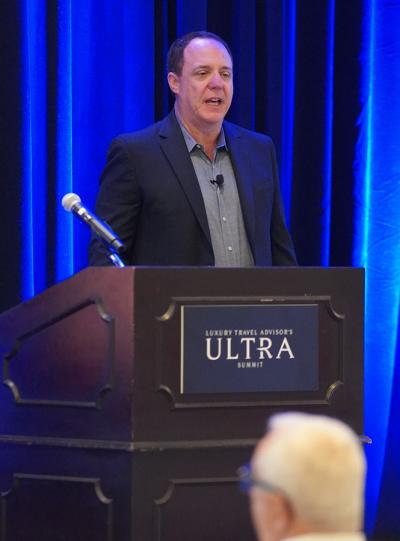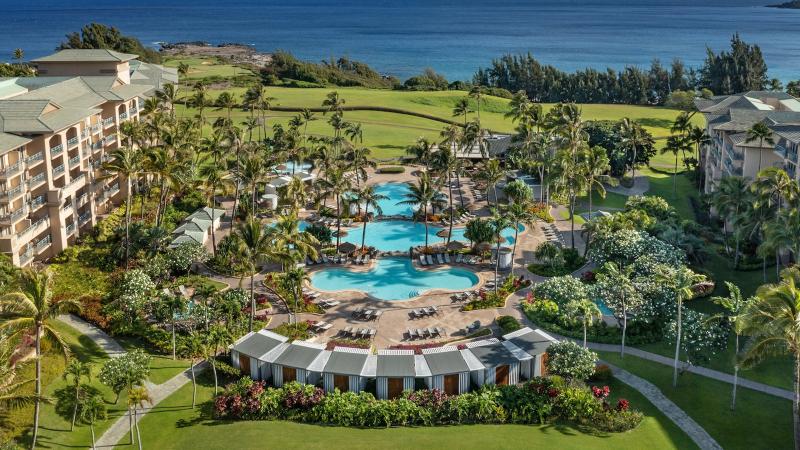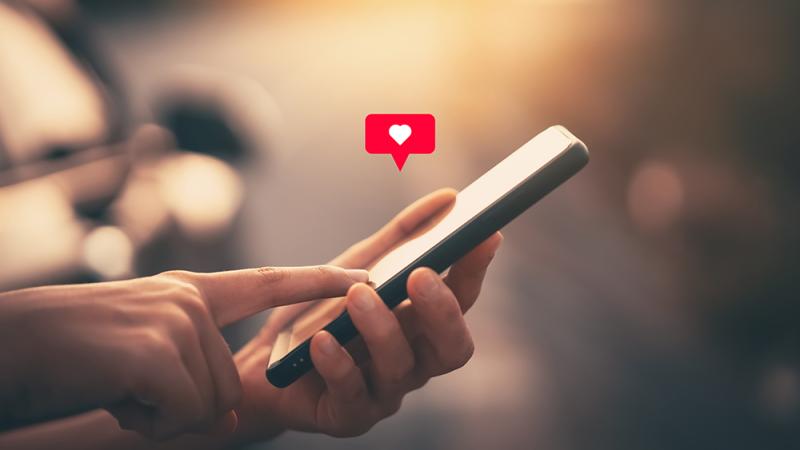Luxury travelers are planning significantly more vacations in the next 12 months, when compared to all other travelers, according to Steve Cohen, special consultant for the Olinger Group and managing partner for Stelico Consulting Group. At Luxury Travel Advisor’s ULTRA Summit last week at the Eau Palm Beach Resort & Spa in Manalapan, FL, Cohen presented “Luxury Market Study,” which surveyed over 1,500 U.S. travelers with an annual household income of at least $100,000. (For travelers to be considered a “luxury traveler,” they must have defined all of their trips as luxury vacations; the remainder are defined as “other travelers.”)
In addition to taking more trips in the next year (3.36 compared to 2.91), luxury travelers are also planning to spend more than other travelers ($11,007 over the next 12 months, compared to $8,748).
Who Are “Luxury Travelers?”

presenting at ULTRA Summit (Photo by Luxury Travel Advisor)
While the $100,000 floor may seem low to some luxury travel advisors, Cohen argued that, should a travel advisor set a minimum income of $250,000, this limits them to just 4 percent of U.S. households. “So, if you're all competing for 4 percent it becomes difficult,” he said. “So, the question becomes, ‘Well, how can people without that income afford to do this?’ Because they don't look at travel as discretionary income. They look at it as a part of what they do and who they are. They budget money for travel.”
What may be surprising, among those surveyed, significantly more Hispanics identified as luxury travelers (10 percent, compared to 7 percent of other travelers) and significantly fewer Asians are defined as luxury travelers. (9 percent, compared to 13 percent of other travelers). It’s also good to know that the luxury traveler is significantly younger and more likely to have children in the household. The median age of a luxury traveler is 46 (53 for other travelers) and most (53 percent) have kids under 18 in the home (35 percent of other travelers).
Research conducted by Luxury Travel Advisor of its attendees prior to ULTRA found that their clients mostly fall within the 51- to 75-year-old age range. Travel advisors are missing a huge part of the market, said Cohen, by only focusing on older travelers. “Don't limit yourself to Gen X and Boomers— because the oldest millennials are 42; the youngest are 26. These are people who you can be cultivating into becoming your future customers.” He continued: “[Younger travelers] are more than willing to spend on the experience because things have changed. Accumulating stuff isn't nearly as important as it once was.”
In fact, when it comes to families, Cohen says,” You can never market too young.” He told a story about how his daughter, when she was 10, wanted to go on a trip to Beverly Hills to spot celebrities. It became a yearly tradition that continued until she went to college. “My 10-year-old built a family tradition for us that probably would've have continued had it not been for the pandemic and the fact that she's in college … But when she gets old enough to have her own family, which I know this is a really long time, don't you think she's going to take the family to Beverly Hills and relive the experiences that she had?”
Do “Luxury Travelers” Use Advisors?
On average, luxury travelers took significantly more vacations that used the services of a travel advisor than did other travelers. On top of that, significantly more plan to use a travel advisor for their vacation(s) in the next two years. Over the past three years, 16 percent of luxury travelers used an advisor (just 6 percent of other travelers did) but over the next three years, 55 percent of luxury travelers will use a travel advisors (38 percent for other travelers).
The increases across the board here are a great sign for travel advisors as many showed their worth throughout the pandemic and appear to have helped solidify their role/importance in planning a vacation. “It's up to you to find them (the 55 percent) and convince them that it's you that's the person they should be working with,” said Cohen.
In addition, luxury travelers who are planning to use a travel advisor said they would use one for such services as booking a vacation package, choosing accommodations, booking a cruise, purchasing airline tickets and picking a destination at a higher rate than other travelers across all categories. Luxury travelers responded they feel travel advisors possessed a strong knowledge of destinations; take the hassle out of booking; offer an extra level of service if things go wrong; can develop complex itineraries that they can’t do on their own; and will find better prices for the total vacation, among others.
While most luxury travelers (93 percent) listed a hotel/resort among their preferred accommodations (compared to 96 percent for other travelers), they are more likely to use a bed and breakfast (23 percent vs. 15 percent), a timeshare (15 percent vs. 13 percent), a personal vacation home (12 percent vs. 9 percent) and an RV/camper (10 percent vs. 6 percent).
What Appeals to “Luxury Travelers?”

According to the study, the top 10 hotel brands in terms of “overall appeal” are The Ritz-Carlton, Four Seasons, JW Marriott, Grand Hyatt, Waldorf Astoria, The St. Regis, InterContinental, Fairmont, Conrad and Loews. When it came to preferred guestroom features, luxury travelers more than other travelers valued housekeeping, the ability to choose a room before arrival, a balcony, name brand toiletries and a digital key. Other top responses (with equal rates of preference) included proper shower temperature/water pressure, complimentary Wi-Fi, the room size/layout, availability of electrical outlets and a refrigerator.
When it comes to cruising, luxury travelers are more interested (49 percent are extremely interested and 28 percent are somewhat interested) than other travelers (29 percent and 30 percent, respectively). Overall, those who enjoy cruising tend to be passionate about it and their interest in cruising seems to have returned. Likely related to the percentage of luxury travelers who have kids at home, Disney Cruise Line (60 percent) had the largest appeal of all lines. The remainder of the top 10 are: Norwegian Cruise Lines, Princes Cruises, Celebrity Cruises, Viking, Holland America Line, Seabourn, Silversea, Cunard and Windstar.
“There are great opportunities for luxury cruise lines to enhance their offerings to kids. Now, they're not going to reach Disney levels, but the more they can do for kids, the more they're going to get that younger luxury traveler that we're all talking about,” added Cohen. “If you're talking to someone who's 40 years old and has an eight- and a 10-year-old, and you're trying to sell them on something extremely high-end but they're thinking more about their kids, you got to give them something where kids have something to do. We've all traveled with kids where there's nothing for them to do and it's an awful experience. Don't put your clients into that position.”
On sustainability, Cohen referenced an article we published in April 2021 noting more than three-quarters of travelers said that, when making vacation plans, it’s very important (50 percent) or somewhat important (28 percent) to choose a hotel, cruise line or travel company that has a strong sustainability policy. Nine percent of respondents at the time said they needed more education on the topic first, while 13 percent said this hasn’t factored into their decision-making. A more recent survey, released in June 2022, found that 70 percent of high-end travelers agreed that traveling sustainably enhances their vacation experience and upwards of 75 percent said they would pay more for such an experience.
How Can You Influence “Luxury Travelers?”

Are travel advisors “influencers?” Well, you should be, says Cohen. Nearly all travelers surveyed have a personal page or social media profile. In fact, just 2 percent said they weren’t on any platform. The most popular were Facebook (91 percent), Instagram (71 percent) and Twitter (60 percent), but many are using Pinterest (42 percent), Snapchat and TikTok (both 36 percent). Across the board, luxury travelers use social media more than other travelers (with Facebook only nearly tied).
If you’re not using platforms like Snapchat or TikTok, “you're missing the opportunity to engage with people at an age where they're susceptible to your ad,” according to Cohen. (He also points out it’s cheaper to advertise on these sites rather than Facebook.)
Similarly, as you might expect, social media has a strong impact on the selection of vacation destination and cruise line/lodging brand used by travelers. More than other travelers, luxury travelers said they selected a vacation destination based partially or primarily on social media (60 and 77 percent, respectively) or that they selected a hotel brand, cruise line, or airline based on social media (76 percent).
According to the study, celebrities and influencers have become important in driving business in many categories, including travel over the last eight to 10 years. Nearly half of luxury travelers (47 percent) follow a celeb or influencer on social media, while six in 10 (60 percent) have purchased travel based on a social media post by a celebrity or influencer.
What Does the Future Hold?
The last bit of good news: The future looks bright for the vacation industry, particularly among luxury travelers. At least 91 percent agreed that “I am more likely to try news things on vacation;” “vacation memories are more valuable than anything I bought in the last year;” “vacationing is the event I most look forward to each year;” and “vacationing bring my family and I closer together.” They also said that their vacation interests have changed in the past three years (76 percent).
Related Articles
Questex Brought Advisors, Suppliers Together at ULTRA Summit
F1S: France, Italy, Greece Are Top International Destinations
Americans Began Flying Private During Pandemic; Many to Continue